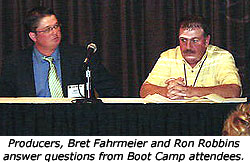 Over 100 recruits survived the 2006 NAMA Boot Camp, August 22-24 in Kansas City. The NAMA Boot Camp officially began with a networking reception followed by a Kansas City Style Barbecue. Afterwards, Dallas Ford, AlphaScouts, led a producer panel discussion with Darren Furbeck, Furbeck Farms, Ron Robbins, dairy and crop producer, and Bret Fahrmeier, Fahrmeier Farms, about how to effectively communicate with the end user. Attendees were given the chance to ask producers questions about their involvement in farming, products they use and challenges they face.
Over 100 recruits survived the 2006 NAMA Boot Camp, August 22-24 in Kansas City. The NAMA Boot Camp officially began with a networking reception followed by a Kansas City Style Barbecue. Afterwards, Dallas Ford, AlphaScouts, led a producer panel discussion with Darren Furbeck, Furbeck Farms, Ron Robbins, dairy and crop producer, and Bret Fahrmeier, Fahrmeier Farms, about how to effectively communicate with the end user. Attendees were given the chance to ask producers questions about their involvement in farming, products they use and challenges they face.
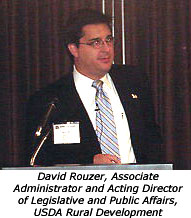 The next morning began with breakfast and the opening session, Ag Policy and How it Relates to Your Job with David Rouzer, USDA Rural Development. Rouzer gave a basic view of the Farm Bill and the impact on agriculture and rural communities with attendees. Rouzer’s information was a perfect lead into a surprise presentation by U.S. Secretary of Agriculture, Mike Johanns.
The next morning began with breakfast and the opening session, Ag Policy and How it Relates to Your Job with David Rouzer, USDA Rural Development. Rouzer gave a basic view of the Farm Bill and the impact on agriculture and rural communities with attendees. Rouzer’s information was a perfect lead into a surprise presentation by U.S. Secretary of Agriculture, Mike Johanns.
Following the special presentation by Secretary Johanns, participants were able to choose between two breakout sessions on a Year in the Life of a Livestock Producer with Ron Robbins and a Year in the Life of a Crop Producer with Debbie Lyons-Blythe. Robbins, and his wife, own a diversified ag business that includes a 4000 acre crop operation which includes corn, soybeans, wheat, barley, alfalfa, hay and provides all feed and forages for their 500-cow dairy operation. Lyons-Blythe, along with her husband, own and operate, Blythe Angus. They maintain 250 cows year round and calve and breed artificially and run the cattle on native grass and brome.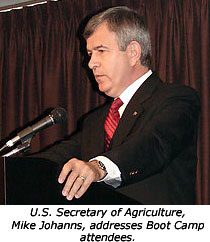
Dr. Gene Brown, director of the Center for Direct Marketing, Education and Research at The Henry Bloch School of Business at UMKC, presented Business-to-Business Marketing during the luncheon on Aug. 23. Dr. Brown explained how the CRM (customer relationship model) survey can be used to identify the needs and attitudes of our customers to help us create the most effective marketing plans for maximizing customer satisfaction and retention.
After lunch, attendees participated in more breakout sessions on Internal Marketing Tools and Working with Checkoff Boards. Mike Gustafson, John Deere and Allison Bass, AGCO Corporation joined forces to teach Boot Camp participants about the pro’s and con’s of internal marketing and the keys to successful internal marketing. Some of the keys to success include: promoting teamwork; capitalizing on your core strengths; outsource items that require temporary expertise; and be competitive in the marketplace.  Monte Reese, Cattlemen’s Beef Promotion and Research Board, discussed how checkoff boards brought us the “incredible edible egg,” “Pork. The Other White Meat,” “Beef. It’s What’s for Dinner,” and “Cotton. The Fabric of Our Lives.” Reese also discussed the dual role of the checkoff board. The first role is marketing to consumers on behalf of farmers and ranchers (building a brand commodity) and the second role is communicating to farmers and ranchers about their programs. In addition, Reese also talked about what checkoff boards want from their agencies and some of the mistakes that are made.
Monte Reese, Cattlemen’s Beef Promotion and Research Board, discussed how checkoff boards brought us the “incredible edible egg,” “Pork. The Other White Meat,” “Beef. It’s What’s for Dinner,” and “Cotton. The Fabric of Our Lives.” Reese also discussed the dual role of the checkoff board. The first role is marketing to consumers on behalf of farmers and ranchers (building a brand commodity) and the second role is communicating to farmers and ranchers about their programs. In addition, Reese also talked about what checkoff boards want from their agencies and some of the mistakes that are made.
The afternoon continued with more breakouts on Evaluating Media and Measuring ROI with Ted Haller, AdFarm and Dealing with Activists with Judy Rupnow, Morgan&Myers. Haller explained that you need to define what you and/or your clients expecations are on ROI. In addition, he discussed what is the reality on media’s role relative to ROI, how to build the ROI Media Model and how to deal with any errors. Rupnow talked to attendees about what activism is and how it works along with who are the activists. She said when confronted with activism you should listen to what they are saying, consider the possibility that they are correct, define the zone of acceptability and work with experts to find a reasonable end. 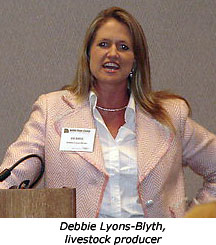 When responding to activism you should maintain your credibility, look for win-win opportunities, secure realists, collaborate with the media, anticipate the activists actions and arguments and borrow from their tactics.
When responding to activism you should maintain your credibility, look for win-win opportunities, secure realists, collaborate with the media, anticipate the activists actions and arguments and borrow from their tactics.
The last day of the Boot Camp kicked off with a continental breakfast and client and agency panel discussions. The client panel was led by Cliff Becker, Food 360 and panel members included Jane Allman, Cargill Animal Nutrition; Stephanie Gable, Ft. Dodge Animal Health; and Bill Pool, Adculture Inc. The agency panel was led by Jim Gresham, Adculture Inc. and panel members included Mike Butler, archer>malmo; Bob Wilhelm, AdFarm; and Leigh Thiel, Martin Williams.
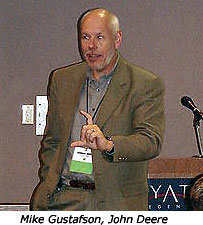 The NAMA Boot Camp ended with The Future of Agri-Marketing with Hugh Whaley, Osborn & Barr Communications. Whaley said to more accurately predict what the future may hold, we need to understand and have a good grasp of the past. He discussed agri-marketing in the 70s, 80s, 90s and the changes that have occurred since then, as well as how agri-marketing is today. Whaley said that the future of agri-marketing will include technology, biofuels, crop trends, continued impact of international markets and more mergers. In addition, he says that marketing strategies will continue to fragment the ag audience, there will be less mass media and more micro-targeting. There will also be more emphasis on CRM and PR and a new media delivery systems. What does this all mean to the future agri-marketer? Adapt or die.
The NAMA Boot Camp ended with The Future of Agri-Marketing with Hugh Whaley, Osborn & Barr Communications. Whaley said to more accurately predict what the future may hold, we need to understand and have a good grasp of the past. He discussed agri-marketing in the 70s, 80s, 90s and the changes that have occurred since then, as well as how agri-marketing is today. Whaley said that the future of agri-marketing will include technology, biofuels, crop trends, continued impact of international markets and more mergers. In addition, he says that marketing strategies will continue to fragment the ag audience, there will be less mass media and more micro-targeting. There will also be more emphasis on CRM and PR and a new media delivery systems. What does this all mean to the future agri-marketer? Adapt or die.
We’d like to take a minute to give a special thanks to all of the sponsors who made the 2006 NAMA Boot Camp possible. For a complete list of our sponsors visit, http://www.nama.org/programs/bootcamp.htm#sponsors.
 It’s time to start putting your entries together for the Best of NAMA program. Best of NAMA honors the best work in agricultural communications. Companies and agencies must first qualify through a regional competition in order to advance to the national level. The national awards ceremony will take place April 11, 2007 at the Hyatt Regency Dallas at Reunion Arena. Regional awards ceremonies will be held in January. (For more information on regional ceremonies visit,
It’s time to start putting your entries together for the Best of NAMA program. Best of NAMA honors the best work in agricultural communications. Companies and agencies must first qualify through a regional competition in order to advance to the national level. The national awards ceremony will take place April 11, 2007 at the Hyatt Regency Dallas at Reunion Arena. Regional awards ceremonies will be held in January. (For more information on regional ceremonies visit,  Hear how producers have adapted to financial pressures and change in the ag industry at the 2006 Agribusiness Forum, November 14-15 in Kansas City.
Hear how producers have adapted to financial pressures and change in the ag industry at the 2006 Agribusiness Forum, November 14-15 in Kansas City. eran farm broadcaster, Don Wick, Red River Farm Network, will moderate this panel which will give marketing professionals new insights into production agriculture.
eran farm broadcaster, Don Wick, Red River Farm Network, will moderate this panel which will give marketing professionals new insights into production agriculture. Bruch currently manages about 11,000 acres of soybeans, cotton and popcorn on acreage he owns and rents for investors through his company, Global Ag Investments. Vrieze is a third-generation dairy producer who owns an interest in more than 3,000 dairy cows in Wisconsin.
Bruch currently manages about 11,000 acres of soybeans, cotton and popcorn on acreage he owns and rents for investors through his company, Global Ag Investments. Vrieze is a third-generation dairy producer who owns an interest in more than 3,000 dairy cows in Wisconsin.  industry experts will help us understand the pressures emerging within agriculture and what might lay ahead for bio-based fuels.
industry experts will help us understand the pressures emerging within agriculture and what might lay ahead for bio-based fuels. currently serves as CEO of the National Corn Growers Association. Prior to NCGA he was the executive director for the U.S. Grains Council and has worked in market planning at International Harvester Company and the Gehl Company.
currently serves as CEO of the National Corn Growers Association. Prior to NCGA he was the executive director for the U.S. Grains Council and has worked in market planning at International Harvester Company and the Gehl Company. Keith is the president of the National Grain and Feed Association. The NGFA represents companies in grain processing, grain elevation, feed manufacturing, exporting and futures. Prior to joining NGFA, Keith was a policy economist for the National Cotton Council.
Keith is the president of the National Grain and Feed Association. The NGFA represents companies in grain processing, grain elevation, feed manufacturing, exporting and futures. Prior to joining NGFA, Keith was a policy economist for the National Cotton Council. To register for the Forum visit,
To register for the Forum visit, 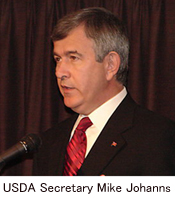 Attendees at the 2006 NAMA Boot Camp were surprised with a special visit from the U.S. Secretary of Agriculture, Mike Johanns on August 23.
Attendees at the 2006 NAMA Boot Camp were surprised with a special visit from the U.S. Secretary of Agriculture, Mike Johanns on August 23. Over 100 recruits survived the 2006 NAMA Boot Camp, August 22-24 in Kansas City. The NAMA Boot Camp officially began with a networking reception followed by a Kansas City Style Barbecue. Afterwards, Dallas Ford, AlphaScouts, led a producer panel discussion with Darren Furbeck, Furbeck Farms, Ron Robbins, dairy and crop producer, and Bret Fahrmeier, Fahrmeier Farms, about how to effectively communicate with the end user. Attendees were given the chance to ask producers questions about their involvement in farming, products they use and challenges they face.
Over 100 recruits survived the 2006 NAMA Boot Camp, August 22-24 in Kansas City. The NAMA Boot Camp officially began with a networking reception followed by a Kansas City Style Barbecue. Afterwards, Dallas Ford, AlphaScouts, led a producer panel discussion with Darren Furbeck, Furbeck Farms, Ron Robbins, dairy and crop producer, and Bret Fahrmeier, Fahrmeier Farms, about how to effectively communicate with the end user. Attendees were given the chance to ask producers questions about their involvement in farming, products they use and challenges they face. The next morning began with breakfast and the opening session, Ag Policy and How it Relates to Your Job with David Rouzer, USDA Rural Development. Rouzer gave a basic view of the Farm Bill and the impact on agriculture and rural communities with attendees. Rouzer’s information was a perfect lead into a surprise presentation by U.S. Secretary of Agriculture, Mike Johanns.
The next morning began with breakfast and the opening session, Ag Policy and How it Relates to Your Job with David Rouzer, USDA Rural Development. Rouzer gave a basic view of the Farm Bill and the impact on agriculture and rural communities with attendees. Rouzer’s information was a perfect lead into a surprise presentation by U.S. Secretary of Agriculture, Mike Johanns.
 Monte Reese, Cattlemen’s Beef Promotion and Research Board, discussed how checkoff boards brought us the “incredible edible egg,” “Pork. The Other White Meat,” “Beef. It’s What’s for Dinner,” and “Cotton. The Fabric of Our Lives.” Reese also discussed the dual role of the checkoff board. The first role is marketing to consumers on behalf of farmers and ranchers (building a brand commodity) and the second role is communicating to farmers and ranchers about their programs. In addition, Reese also talked about what checkoff boards want from their agencies and some of the mistakes that are made.
Monte Reese, Cattlemen’s Beef Promotion and Research Board, discussed how checkoff boards brought us the “incredible edible egg,” “Pork. The Other White Meat,” “Beef. It’s What’s for Dinner,” and “Cotton. The Fabric of Our Lives.” Reese also discussed the dual role of the checkoff board. The first role is marketing to consumers on behalf of farmers and ranchers (building a brand commodity) and the second role is communicating to farmers and ranchers about their programs. In addition, Reese also talked about what checkoff boards want from their agencies and some of the mistakes that are made. When responding to activism you should maintain your credibility, look for win-win opportunities, secure realists, collaborate with the media, anticipate the activists actions and arguments and borrow from their tactics.
When responding to activism you should maintain your credibility, look for win-win opportunities, secure realists, collaborate with the media, anticipate the activists actions and arguments and borrow from their tactics. The NAMA Boot Camp ended with The Future of Agri-Marketing with Hugh Whaley, Osborn & Barr Communications. Whaley said to more accurately predict what the future may hold, we need to understand and have a good grasp of the past. He discussed agri-marketing in the 70s, 80s, 90s and the changes that have occurred since then, as well as how agri-marketing is today. Whaley said that the future of agri-marketing will include technology, biofuels, crop trends, continued impact of international markets and more mergers. In addition, he says that marketing strategies will continue to fragment the ag audience, there will be less mass media and more micro-targeting. There will also be more emphasis on CRM and PR and a new media delivery systems. What does this all mean to the future agri-marketer? Adapt or die.
The NAMA Boot Camp ended with The Future of Agri-Marketing with Hugh Whaley, Osborn & Barr Communications. Whaley said to more accurately predict what the future may hold, we need to understand and have a good grasp of the past. He discussed agri-marketing in the 70s, 80s, 90s and the changes that have occurred since then, as well as how agri-marketing is today. Whaley said that the future of agri-marketing will include technology, biofuels, crop trends, continued impact of international markets and more mergers. In addition, he says that marketing strategies will continue to fragment the ag audience, there will be less mass media and more micro-targeting. There will also be more emphasis on CRM and PR and a new media delivery systems. What does this all mean to the future agri-marketer? Adapt or die.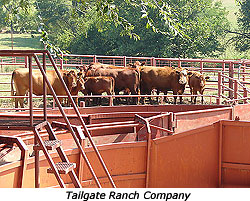 The MoKan NAMA chapter hosted it’s second annual ag tour inconjunction with the NAMA Boot Camp on Tuesday, August 22.
The MoKan NAMA chapter hosted it’s second annual ag tour inconjunction with the NAMA Boot Camp on Tuesday, August 22.